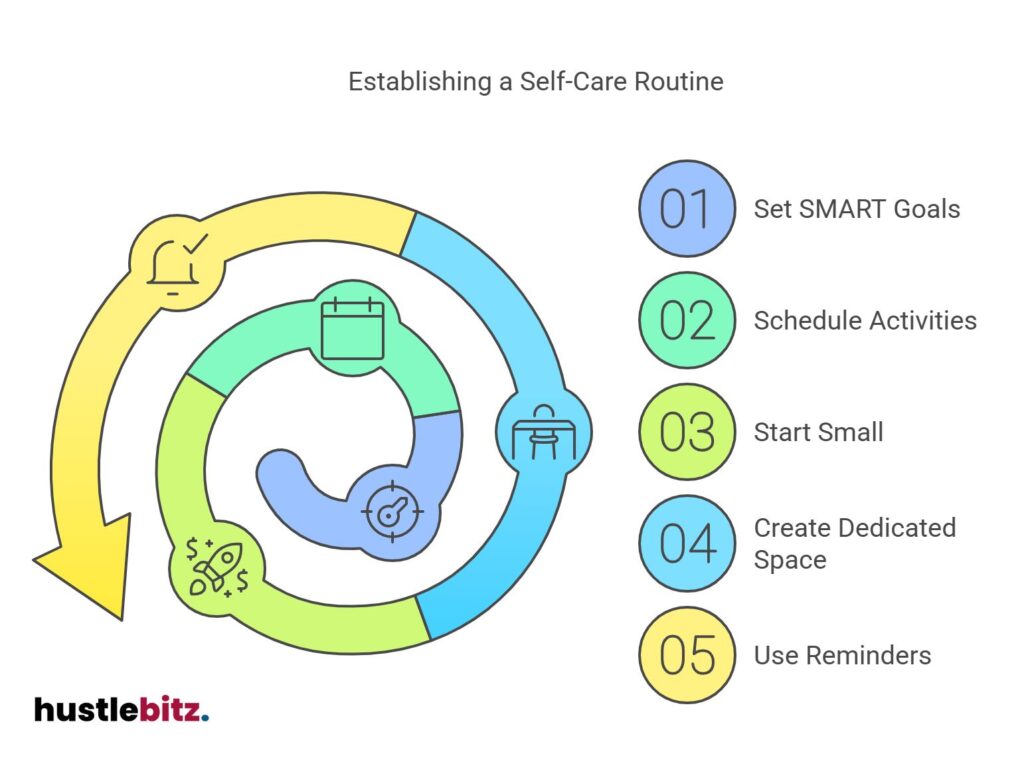To maintain a consistent self-care routine, start by setting clear, achievable goals that align with your values. Schedule dedicated times for self-care activities, treating them as essential commitments. Begin with small, manageable practices to prevent feeling overwhelmed, gradually expanding as you become comfortable. Create a designated space that promotes relaxation and mindfulness, serving as a cue to prioritize self-care. Identify enjoyable activities that enhance your well-being and track your experiences to build self-awareness. Finally, utilize reminders and alarms to stay accountable. With these strategies in hand, discover further insights into enriching your self-care practices.
Key Takeaways
- Establish clear, specific goals for self-care using SMART criteria to create a focused roadmap.
- Schedule dedicated time for self-care activities, incorporating them into your daily or weekly routine.
- Start small with manageable practices, gradually expanding as you build a sustainable self-care routine.
- Create a dedicated space for self-care, using it as a cue to prioritize your well-being.
- Use reminders and alarms to stay accountable and transform self-care activities into habitual practices.

Set Clear Goals
Setting clear goals is essential for establishing a self-care routine that is both effective and sustainable. By defining specific objectives, individuals can create a roadmap that guides their self-care activities, ensuring they are meaningful and aligned with personal values. To set clear goals, it is important to identify what aspects of self-care are most significant, whether that be physical health, mental well-being, or emotional resilience.
One effective self-care tip is to utilize the SMART criteria—ensuring goals are Specific, Measurable, Achievable, Relevant, and Time-bound. For instance, rather than stating a vague intention to ‘exercise more,’ an individual can set a goal to ‘attend a yoga class twice a week for the next month.’ This clarity helps in establishing a consistent self-care routine, as it eliminates ambiguity and provides a clear target to strive for.
Furthermore, prioritizing these goals is crucial. Individuals must recognize that self-care is not a luxury but a necessity. Allocating time for self-care should be treated with the same importance as work or family commitments. By intentionally carving out time in daily or weekly schedules, individuals reinforce their commitment to their well-being.
Schedule Self-Care Time

Incorporating scheduled self-care time into daily or weekly routines reinforces the commitment to achieving the previously established personal goals. By designating specific times for self-care activities, individuals can ensure that they prioritize their well-being amidst busy schedules. This proactive approach not only fosters a consistent self-care routine but also makes it easier to incorporate self-care practices into everyday life.
To illustrate effective scheduling, consider the following table:
| Day | Morning Activity | Evening Activity |
| Monday | 15 minutes of meditation | Read a book for 30 mins |
| Wednesday | 30-minute yoga session | Journal reflections |
| Friday | Nature walk for 20 mins | Pamper with a bath |
| Sunday | Meal prep for the week | Family game night |
Start Small

Beginning with manageable self-care practices allows individuals to gradually build a routine that fits seamlessly into their lives.
Starting small is essential in establishing a sustainable self-care routine, as it helps avoid feelings of overwhelm. When individuals attempt to incorporate too many self-care activities at once, they may find it challenging to stick to a routine, leading to frustration and potential abandonment of these practices.
To effectively practice self-care, consider selecting one or two activities that resonate with you. This could be as simple as dedicating five minutes a day to mindfulness or enjoying a short walk outside. By starting small, you create opportunities for success, reinforcing positive habits over time.
Once these initial activities become a natural part of your day, you can gradually expand your self-care routine to include additional practices that promote well-being.
It’s also beneficial to track your progress, as this can serve as motivation to continue. Journaling your experiences or using a habit-tracking app can help you visualize your commitment to self-care.
Create a Dedicated Space

Establishing a dedicated space for self-care can significantly enhance your commitment to these practices, providing a physical reminder of your intention to prioritize well-being. This space does not need to be expansive; it merely requires a quiet corner or a specific room where you can regularly engage in self-care activities. By designating a physical area, you create an environment that fosters relaxation and mindfulness, essential components for nurturing self-care habits.
When you create a self-care routine, this space allows for a seamless transition into your self-care time. Ensure that this area is equipped with items that resonate with you—soft cushions, soothing scents, or your favorite books. Such personalized touches can make your dedicated space a sanctuary, encouraging you to engage in an activity that promotes mental and emotional wellness.
Consistency is key in forming self-care habits, and having a dedicated space reinforces this discipline. Each time you enter this area, your mind will signal that it is time to unwind and prioritize your needs. It serves as a visual cue to break away from daily distractions, allowing you to focus on self-nurturing practices without interruption.
Ultimately, the act of creating a dedicated space is a vital step in maintaining a consistent self-care routine. By cultivating this environment, you empower yourself to invest time and effort into your well-being, making self-care an integral part of your daily life.
Find Enjoyable Activities

Identifying enjoyable activities is essential to crafting a sustainable self-care routine that genuinely enhances your well-being and personal fulfillment. Engaging in an activity that brings you joy not only fosters a sense of accomplishment but also serves as a vital component in managing stress and anxiety. To improve your well-being, it is crucial to explore various activities and find what works best for you.
Begin by reflecting on what truly resonates with you. This could range from creative outlets like painting and writing to physical activities such as hiking or yoga. The key is to ensure that these activities encourage you to focus your attention on the present moment, allowing for a deeper connection with yourself. Mindfulness during these moments can significantly amplify the benefits of your self-care routine.
As you experiment with different activities, take note of how each one makes you feel. Consider keeping a journal to document your experiences, which can help you identify patterns and preferences. This practice not only enhances self-awareness but also encourages the continuous evolution of your self-care routine.
Ultimately, the goal is to cultivate a repertoire of enjoyable activities that can be seamlessly integrated into your daily life. By prioritizing what brings you happiness and fulfillment, you will create a self-care routine that not only supports your mental and emotional health but also enriches your overall quality of life.
Use Reminders and Alarms

Incorporating reminders and alarms into your self-care routine can significantly enhance your ability to prioritize and engage in essential activities that promote well-being. By utilizing technology and tools available at our fingertips, you can effectively create a consistent self-care routine that aligns with your personal needs and goals.
Setting reminders on your smartphone, computer, or even through physical calendars can serve as gentle nudges to engage in activities outlined in your self-care plan. These prompts can help you proactively allocate time for practices such as meditation, exercise, or journaling, which are often overlooked in the hustle of daily life.
Establishing specific times for self-care activities through alarms can also foster accountability. For instance, if you set an alarm for a mid-morning break to stretch or take a quick walk, you are more likely to prioritize that time for yourself. Over time, these reminders can transform into habitual practices, reinforcing your commitment to well-being.
Moreover, consider using apps designed for wellness that offer customizable reminders tailored to your personal self-care routine. These tools not only remind you when to engage in self-care but can also track your progress, providing motivation to continue your efforts.
Final Thoughts
Maintaining a consistent self-care routine is crucial for sustaining your well-being and overall life satisfaction. By setting clear goals, scheduling dedicated time, starting small, creating a dedicated space, finding enjoyable activities, and using reminders, you can seamlessly integrate self-care into your daily life. Remember, self-care is a personal journey that evolves over time. Stay committed to your routine, make adjustments as needed, and prioritize activities that truly resonate with you. By doing so, you’ll cultivate a healthier, more balanced life where self-care becomes a natural and essential part of your everyday experience.




